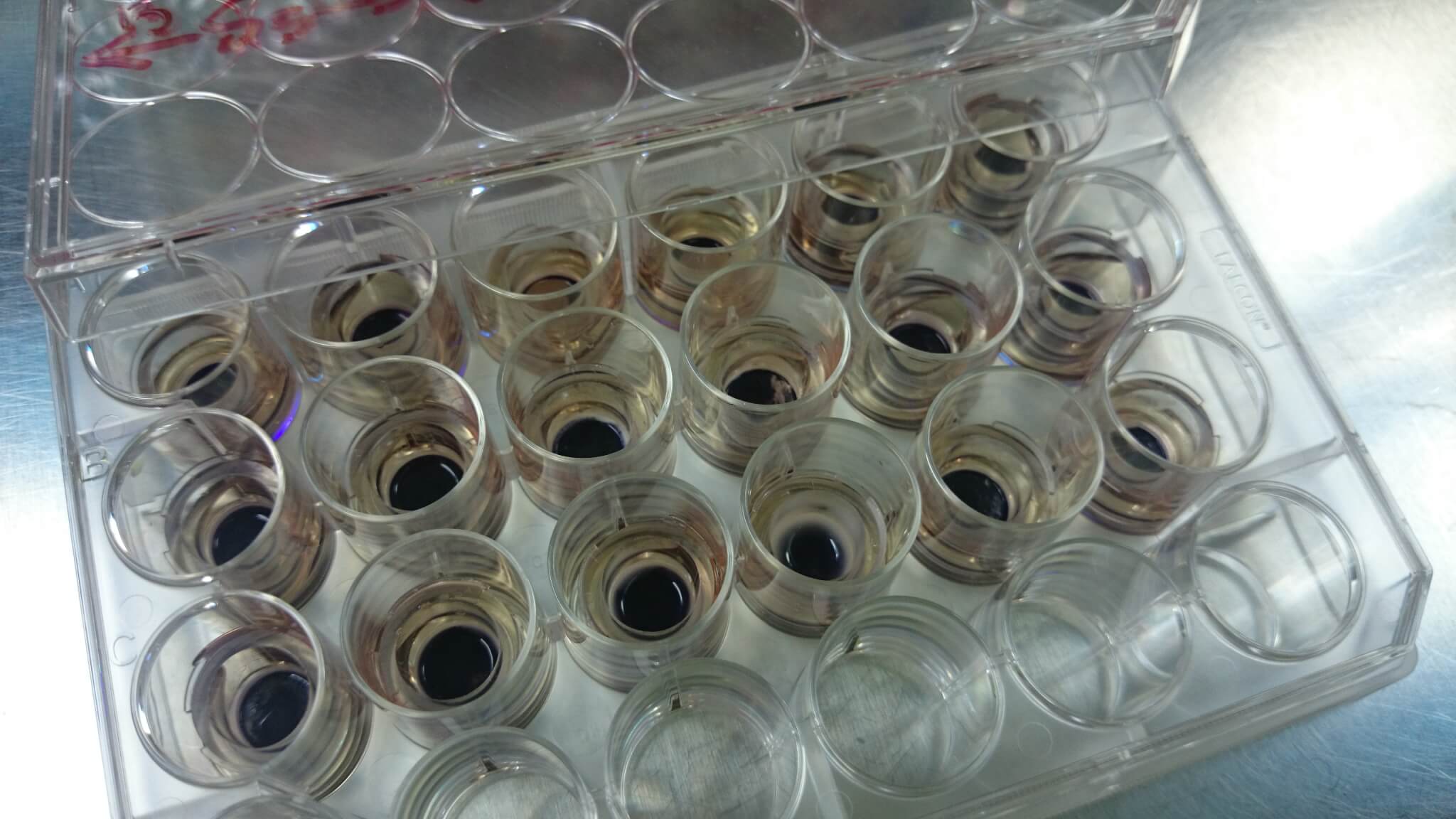In Vitro cosmetic testing
QACS provides a number of in vitro testing services for evaluating the safety of ingredients in manufacturer’s products using cells and reconstructed tissues. Thus, using non-animal models we can assess the toxicological potential of raw materials or finished products such as irritation, corrosion, cytotoxicity and gene disrupting effects. In addition, these cell culture systems are used for assessing the impact of stress factors to final products (e.g., UV radiation in sunscreen products).
QACS Lab provides GLP certified (Good Laboratory Practices) testing services. We operate an organized testing facility for GLP certified toxicological studies. In Vitro Testing services are applied on medicines, cosmetics, medical devices, disinfectants and chemicals. Check our GLP certification here
Available In Vitro tests
In vitro Eye Irritation OECD 492
The test product is applied to the surface of the cornea epithelial construct for a fixed period, removed, and the tissue is allowed to express the resulting damage. Relative tissue viability is determined against the negative control-treated constructs by the reduction of the vital dye MTT
In vitro Skin Irritation OECD 439
The test consists of a topical exposure of the test product to a reconstructed human epidermis (RhE) model followed by a cell viability test. Cell viability is measured by dehydrogenase conversion of MTT, present in cell mitochondria, into a blue formazan salt that is quantitatively measured after extraction from tissues. The reduction of the viability of tissues exposed to chemicals in comparison to negative controls (treated with water) is used to predict the skin irritation potential.
In vitro Skin Corrosion OECD 431
EpiDerm tissues are conditioned by pre-incubation. After pre-incubation tissues topically exposed with the test product for 3 min and 1 hr, respectively. After exposure tissues are rinsed and blotted and assay medium is replaced by MTT-medium. Cell viability is measured by dehydrogenase conversion of MTT, present in cell mitochondria, into a blue formazan salt that is quantitatively measured after extraction from tissues. The optical density (OD) of the formazan extract is determined spectrophotometrically at 540 -570 nm, and cell viability is calculated for each tissue as % of the mean of the negative control tissues. Skin corrosivity potential of the test materials is classified according to the remaining cell viability obtained after 3 minutes or 1 hour exposure with the test chemical.
In vitro Inhalation Toxicity Test
The surface of EpiAirway™ tissues (AIR-100) are exposed to the test product for 3 h in standard conditions (37 °C, 5% CO2). Untreated controls were also included in each experiment. Following exposure, the surface was rinsed with PBS and the MTT assay for tissue viability was performed to calculate the IC75 relative to the untreated control tissues.
In Vitro 3T3 NRU Phototoxicity Test OECD 432
Phototoxicity is defined as a toxic response elicited by topically or systemically administered photoreactive products after the exposure of the body to environmental light. According to OECD 432, the in vitro 3T3 Neutral Red Uptake (NRU) phototoxicity test is used to identify the phototoxic potential of a test product activated by exposure to light.
Categorization of eye irritation/serious eye damage assessment OECD 492 and OECD 437 (RM)
Specific categorization of material (No category – Non irritant/corrosive, Category 1- Corrosive, Category 2 – Irritant) for Material safety data sheet completion. The approach includes a combination of validated methods (OECD 492 and OECD 437) at a top-down or bottom-up model testing.
Mutagenicity/Genotoxicity evaluation – Bacterial Reverse Mutation (AMES) Test OECD 471
The bacterial reverse mutation test is commonly employed as an initial screen for genotoxic activity and, in particular, for point mutation-inducing activity.
Eye Irritation Test ET50
When developing new personal care or cosmetic formulations, the assessment of eye irritation potential is crucial to identify products that may cause adverse corneal reactions. Understanding irritation risk early helps prevent unnecessary exposure of human volunteers to potentially irritating materials during clinical testing and assure your product’s safety.
One widely used in vitro method for this assessment is the ET-50 assay. This test:
– Utilizes Reconstructed human Cornea-like Epithelium (RhCE) tissues
– Measures the time to toxicity (ET-50) to predict expected in vivo irritancy responses
– Helps rank formulations based on their eye irritation potential
The ET-50 assay determines the effective time at which a material—applied neat or diluted as intended—causes a 50% reduction in tissue viability. The results classify test materials into four categories, ranging from non-irritating to severe/extreme, aligning with Rabbit Draize Eye Scores.
This scientifically validated, ethical, and efficient method provides essential insights during formulation development, ensuring safer and more consumer-friendly products.
![]()
For In Vitro testing solutions for medicines, cosmetics, medical devices, disinfectants and chemicals contact us – [email protected] – +30 210 29 34745

